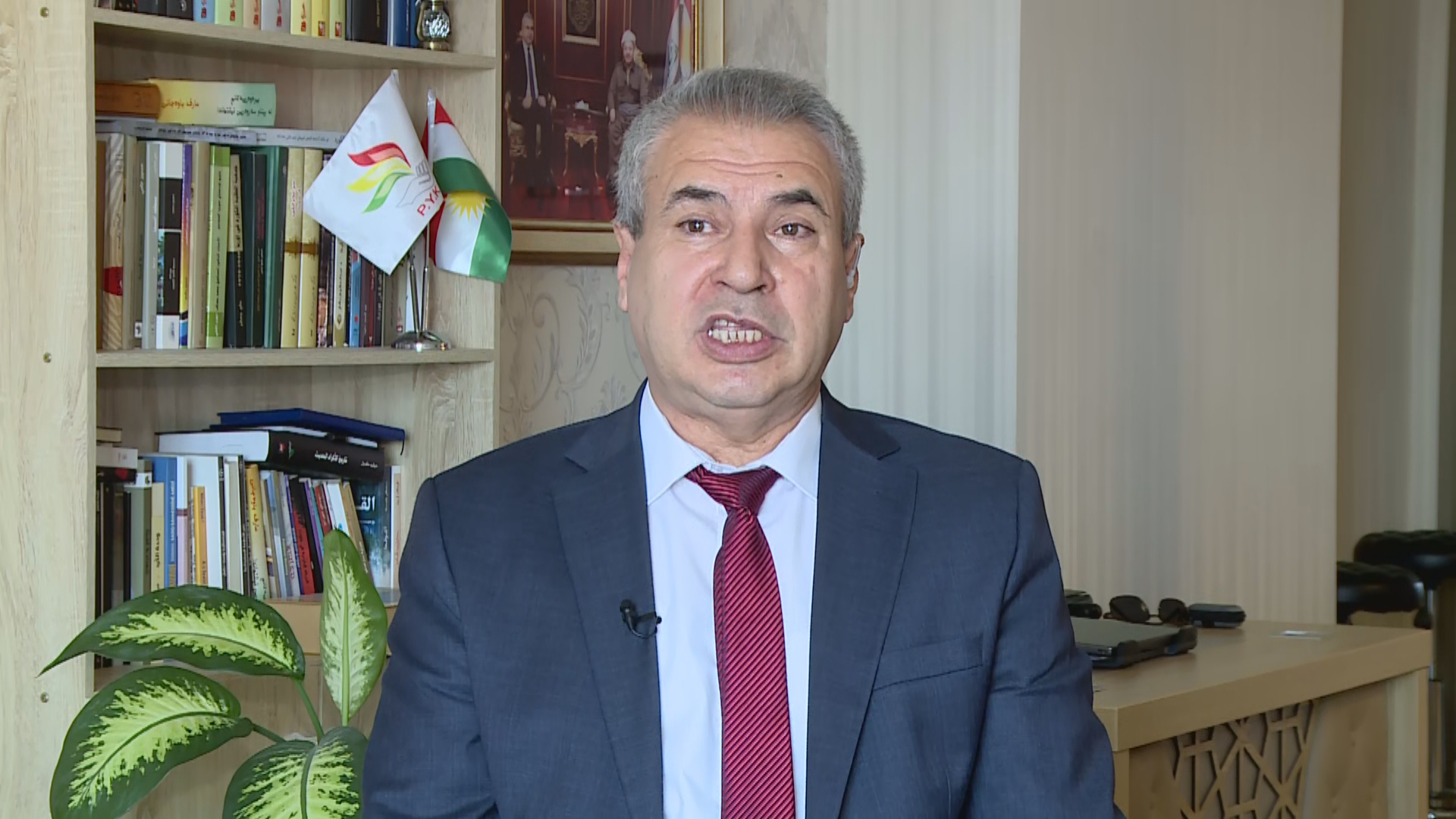
Fighters affiliated with Syria's Hayat Tahrir al-Sham (HTS) search vehicles at a checkpoint they control in Daret Ezza, in the western countryside of the northern Aleppo province. Date: April 10, 2022. Photo: AFP
ERBIL, Kurdistan Region - A senior official from the opposition group, Kurdish National Council’s (ENKS), in northeast Syria (Rojava) told Rudaw on Friday they suspect that the recent takeover of the Kurdish city of Afrin in northwest Syria by the Hay’at Tahrir al-Sham (HTS) fighters was done in coordination with Turkey and the United States.
HTS, which has been internationally recognized as a terrorist organization, on October 13 took control of Afrin city following clashes with pro-Turkey forces over the assassination of an activist. Turkey deployed forces to the city to de-escalate the situation. The group, formerly known as al-Nusra Front, was a branch of al-Qaeda.
Five days later, the US embassy in Syria, which has been closed since 2012 due to the Syrian civil war, said in a vague and short tweet that Washington was “deeply concerned about the recent violence in northwest Syria” without mentioning the HTS . Minutes later, it said in a separate tweet that they were “alarmed by the recent incursion of HTS, a designated terrorist organization, into northern Aleppo.” The embassy also called on the radical group to leave the area “immediately.”
Afrin is located in Aleppo province.
Ibrahim Biro, head of ENKS’ foreign affairs, told Ruduw’s Sima Abkhezr on Friday that the US government’s ''silence” in the first few days after the takeover makes them suspect that Washington greenlighted it.
“No parties have said they have reached any deals [with HTS] but we believe this entrance [of HTS into Afrin] was done in coordination with Turkey and Americans. The US and Turkey say that their presence in Syria is related to the fight against terrorism but Hay’at Tahrir al-Sham, which is listed as a terrorist organization, deployed large number of fighters to the region but the US remained silent. Therefore, we believe that the US and Turkey were aware of this [deployment],” Biro said.
He added that the US initially did not use the word “terrorist” to HTS but later did, referring to the two tweets by the US embassy in Syria.

Turkey has neither condemned nor endorsed the developments in Afrin publicly.
The unrest came days after the death of a prominent activist in the Turkey-controlled al-Bab city. Muhammad Abdul Latif, locally known as Abo Ghanoum, and his wife were killed by unidentified gunmen on October 7. The Third Legion, which controls the city, launched an investigation and later concluded that the couple were killed by al-Hamza Division (al-Hamzat). Therefore, the legion raided the al-Hamzat’s bases, expelling them from al-Bab and Afrin. The HTS expressed support to the al-Hamzat and launched attacks against the Third Legion.
Biro said that the HTS has reportedly withdrawn from Afrin but their dominance over the city remains.
“They have reportedly withdrawn but we have heard that it still has influence as many fighters affiliated to it [HTS] are present. This is concerning. We have informed Turkey and the [Syrian opposition] Coalition about this. We will also inform the Americans. There should be clarification [in this regard] in the future about the fate of the region,” he said.
ENKS is a member of the Turkey-backed Syrian opposition.
Elbrus Kutrashev, Russian ambassador to Iraq, told Rudaw on Tuesday that what is happening in Afrin is a “drama.”
Russia, which considers HTS a terrorist organization, has supported Syrian regime in the fight against the HTS for years, especially in Idlib province which is still under the group’s control.
Kurdish forces, People’s Protection Units (YPG), controlled Afrin after Syrian regime forces withdrew from it in the beginning of an uprising in the country in 2011. However, Turkey and its Syrian mercenaries invaded the city in 2018, causing the displacement of hundreds of thousands of Kurds as well as committing crimes against those who stayed.




![SDF logo and French President Emmanuel Macron speaking at an event at the Elysee Palace in Paris on January 6, 2025 [Photo: AFP]. Graphic: Rudaw. SDF logo and French President Emmanuel Macron speaking at an event at the Elysee Palace in Paris on January 6, 2025 [Photo: AFP]. Graphic: Rudaw.](https://www.rudaw.net/s3/rudaw.net/ContentFiles/844167Image1.jpg?mode=crop&quality=70&rand=1&scale=both&w=362&h=226&version=7263792)



Comments
Rudaw moderates all comments submitted on our website. We welcome comments which are relevant to the article and encourage further discussion about the issues that matter to you. We also welcome constructive criticism about Rudaw.
To be approved for publication, however, your comments must meet our community guidelines.
We will not tolerate the following: profanity, threats, personal attacks, vulgarity, abuse (such as sexism, racism, homophobia or xenophobia), or commercial or personal promotion.
Comments that do not meet our guidelines will be rejected. Comments are not edited – they are either approved or rejected.
Post a comment